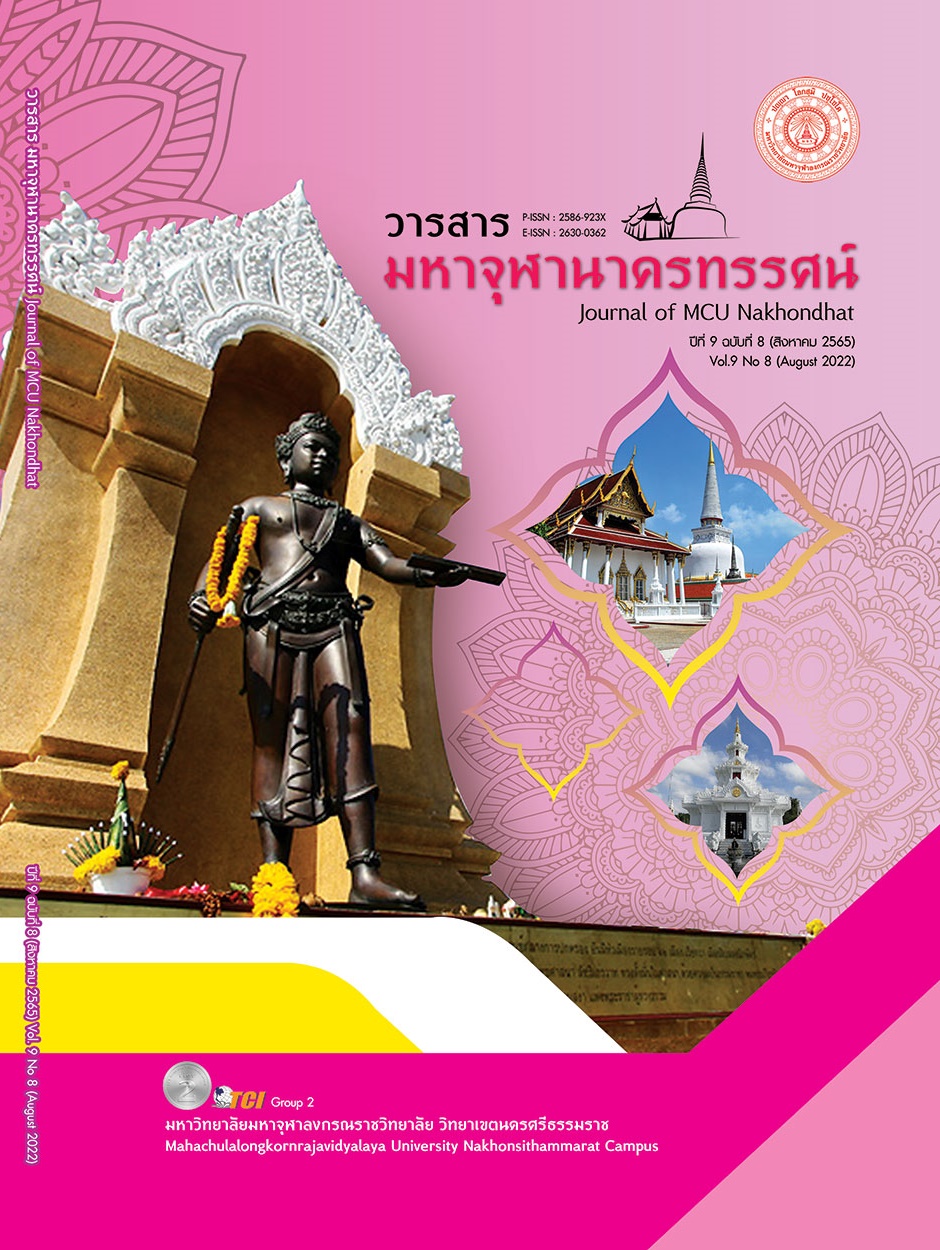THE RELATIONSHIP BETWEEN GOOD GOVERNANCE AND CONFLICT MANAGEMENT OF STAFF AT A RAJABHAT UNIVERSITY
Main Article Content
Abstract
The objectives if this research were to 1) study the process of good governance of staff at a Rajabhat university, 2) investigate conflict management of staff at a Rajabhat university and 3) investigate the relationship between good governance and conflict management of staff at a Rajabhat university using a quantitative research approach. The population in the study was 756 staff at a Rajabhat university. The participants of this research were 262 staff. Using a quota sampling method by dividing the sample by segments and selecting the participants by accidental sampling. The instrument used to collect the data was questionnaire. The data obtained were analyzed by mean, percentage, standard deviation and Pearson product-moment correlation. The results of the research revealed that 1) the overall score of the process of good governance was at the highest level. All principle were at the highest level. It was found that the principle of moral was the most average, followed by principle of law, principle of transparency, principle of participation, principle of responsibility, and principle of value. 2) The overall score of conflict management was at high level, it was found that dominating was the most average and the most level. Secondly Integrating, compromising, Obliging and avoiding ,all the highest level. And 3) the relationship between good governance and conflict management of staff at a Rajabhat university found that it was low positive relationship statistically significance difference at 0.01.
Article Details

This work is licensed under a Creative Commons Attribution-NonCommercial-NoDerivatives 4.0 International License.
References
กันตภณ สุคันธพงษ์. (2558). ทัศนคติเกี่ยวกับธรรมาภิบาลของผู้มาติดต่อราชการกับสำนักงานเลขาธิการสภาพผู้แทนราษฎร. ใน สารนิพนธ์รัฐประศาสนศาสตรมหาบัณฑิต สาขารัฐประศาสนศาสตร์. มหาวิทยาลัยสยาม.
คณิต เรืองขจร. (2557). กรณีศึกษาบุคลากรคณะบริหารธุรกิจมหาวิทยาลัยเทคโนโลยีราชมงคลทั้ง 4 . ใน วิทยานิพนธ์บริหารธุรกิจมหาบัณฑิต สาขาเอกการจัดการทั่วไป. มหาวิทยาลัยเทคโนโลยีราชมงคลธัญบุรี.
ชัยวิชิต เชียรชนะ. (2562). สถิติสำหรับการวิจัย: แนวคิดและการประยุกต์ใช้. (พิมพ์ครั้งที่ 2). กรุงเทพมหานคร: จุฬาลงกรณ์มหาวิทยาลัย.
เบญยาศิริ งามสะอาดและคณะ. (2565). การใช้หลักธรรมาภิบาลในการบริหารงานเทศบาลตำบลบางเดื่อ อำเภอเมืองปทุมธานี จังหวัดปทุมธานี. วารสารมหาจุฬานาครทรรศน์, 48-61.
ปรารถนา หลีกภัย. (2564). การจัดการความขัดแย้งจากการทำงานของข้าราชการครูในจังหวัดตรัง. วารสารสถาบันพระปกเกล้า, 19(1), 93-113.
ระเบียบสำนักนายรัฐมนตรีว่าด้วยการสร้างระบบบริหารกิจการบ้านเมืองและสังคมที่ดีพ.ศ. 2542. (2542). ใน ราชกิจจานุเบกษา. เล่ม 116 ตอน 63ง. หน้า 24-31.
รัตติกรณ์ จงวิศาล. (2560). มนุษยสัมพันธ์: พฤติกรรมมนุษย์ในองค์การ. กรุงเทพมหานคร: มหาวิทยาลัยเกษตรศาสตร์.
ลัดดาวัลย์ เพชรโรจน์ และอัจฉรา ชำนิประศาสน์. (2547). ระเบียบวิธีการวิจัย. กรุงเทพมหานคร: พิมพ์ดีการพิมพ์.
วุฒิชัย อารักษ์โพชฌงค์ และลักขิกา วารีสมบูรณ์. (2561). กลไกทางจริยธรรมของผู้นำเพื่อการจัดการความขัดแย้งในองค์การ. วารสาร RMUTT GLOBAL BUSINESS AND ECONOMICS REVIEW, 13(2), 17-34.
ศิริชัย กาญจนวาสี. (2544). การเลือกใช้สถิติที่เหมาะสมสำหรับการวิจัย. (พิมพ์ครั้งที่ 4). กรุงเทพมหานคร: บุญศิริการพิมพ์.
สำนักงานคณะกรรมการพัฒนาการเศรษฐกิจและสังคมแห่งชาติ. (2560). แผนพัฒนาเศรษฐกิจและสังคมแห่งชาติฉบับที่ 12 (พ.ศ. 2560-2564). เรียกใช้เมื่อ 2 กันยายน 2561 จาก http://www.nesdb.go.th/ewt_news.php?nid=6420&filename=develop_issue
สำนักงานคณะกรรมการพัฒนาการเศรษฐกิจและสังคมแห่งชาติ. (2561). แผนพัฒนาเศรษฐกิจและสังคมแห่งชาติฉบับที่แปด (พ.ศ. 2540-2544). เรียกใช้เมื่อ 2 กันยายน 2561 จาก http://www.nesdb.go.th/ewt_dl_link.php?nid=3783
สุปรียา วงศ์พรต, นันจิรา สังวาล และเอื้องฟ้า เขากลม. (2564). ความขัดแย้งและแรงจูงใจในการปฏิบัติงานของบุคลากรเทศบาลนครนครศรีธรรมราช อำเภอเมืองนครศรีธรรมราช จังหวัดนครศรีธรรมราช. วารสารมนุษยศาสตร์และสังคมศาสตร์ มหาวิทยาลัยราชภัฏอุบลราชธานี, 12(1), 260-267.
เอื้องฟ้า เขากลม. (2562). หลักธรรมาภิบาล การจัดการความขัดแย้ง และพฤติกรรมการเป็นสมาชิกที่ดีขององค์การ. วารสารมนุษยศาสตร์สังคมศาสตร์, 36(2), 102-124. Hinkle, D.E., William, W. & Stephen G.J. (1998). Applied Statistics for the Behavior Sciences . (4th ed.). New York: Houghton Miffin.
Likert, R. (1932). A technique for the measurement of attitudes. Archives of Psychology, 22 (140), 1-55.
Rahim, M. A. (1985). A strategy for managing conflict in complex organizations. human relations. Human Relations,, 38(1), 81-89.
Robbins, S. P. , & Judge,T. A. (2013). เรียกใช้เมื่อ 5 May 2016 จาก Organizational Behavior: http://bba12.weebly.com/uploads/9/4/2/8/9428277/ organizational_behavior_15e__stephen_p_robbins__timothy_a_judge_pdf_qwerty.pdf.


